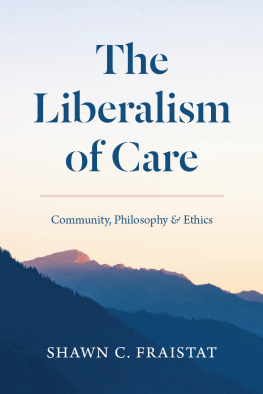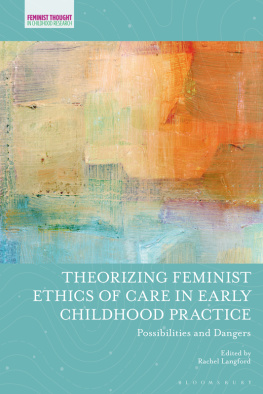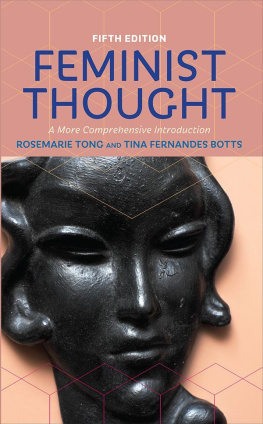JUSTICE AND CARE
First published 1995 by Westview Press
Published 2018 by Routledge
711 Third Avenue, New York, NY 10017, USA
2 Park Square, Milton Park, Abingdon, Oxon OX14 4RN
Routledge is an imprint of the Taylor & Francis Group, an informa business
Copyright 1995 Taylor & Francis
All rights reserved. No part of this book may be reprinted or reproduced or utilised in any form or by any electronic, mechanical, or other means, now known or hereafter invented, including photocopying and recording, or in any information storage or retrieval system, without permission in writing from the publishers.
Notice:
Product or corporate names may be trademarks or registered trademarks, and are used only for identification and explanation without intent to infringe.
Justice and care: essential readings in feminist ethics / edited by Virginia Held.
p. cm.
Includes bibliographical references.
ISBN 0-8133-2161-1. ISBN 0-8133-2162-X (pbk.)
1. Feminist ethics. 2. Caring. 3. Justice. I. Held, Virginia.
BJ1395.J87 1995
170.82dc20
95-2901
CIP
ISBN: 9780429499463 (ebk)
Contents
, Nel Noddings
, Carol Gilligan
, Annette C. Baier
, Marilyn Friedman
, Claudia Card
, Joan C. Tronto
, Patricia Hill Collins
, Margaret Urban Walker
, Virginia Held
, Alison M. Jaggar
, Sara Ruddick
For my daughter Julia, whose motherly caring and dispensing of justice inspire me, and for my son Philip, who turns ordinary events into occasions of joy and laughter. For their spouses also, who show how marriages can work, and for my grandchildren. Finally, for Robert, who delights his varied audiences and with whom I share the years.
Reprinted with deletions of text and notes from Nel Noddings, Caring: A Feminine Approach to Ethics and Moral Education. Copyright 1984 by The Regents of the University of California. |
Reprinted from Carol Gilligan, Moral Orientation and Moral Development, in Women and Moral Theory, edited by Eva Feder Kittay and Diana T. Meyers. Copyright 1987 by Rowman and Littlefield. |
Reprinted from Annette C. Baier, The Need for More than Justice, in Science, Morality and Feminist Theory, edited by Marsha Hanen and Kai Nielsen. Copyright 1987 by the University of Calgary Press. |
Reprinted from Marilyn Friedman, Beyond Caring: The De-Moralization of Gender, in Science, Morality and Feminist Theory, edited by Marsha Hanen and Kai Nielsen. Copyright 1987 by the University of Calgary Press. |
Reprinted with deletions of the text and notes from Claudia Card, Gender and Moral Luck, in Identity, Character, and Morality: Essays in Moral Psychology, edited by Owen Flanagan and Amlie Oksenberg Rorty. Copyright 1990 by Massachusetts Institute of Technology. |
Reprinted from Joan C. Tronto, Women and Caring: What Can Feminists Learn About Morality from Caring? in Gender/Body/Knowledge, Alison M. Jaggar and Susan R. Bordo, eds., copyright 1989 by Rutgers, the State University. Reprinted by permission of Rutgers University Press. |
Reprinted with deletions of text and notes from Black Feminist Thought: Knowledge, Consciousness, andthe Politics of Empowerment (1991), by permission of the publisher, Routledge, New York. Copyright 1991 by Routledge, Chapman and Hall, Inc. |
Reprinted by permission from Margaret Urban Walker, Moral Understandings: Alternative Epistemology for a Feminist Ethics. First published in 1989 by Hypatia: A Journal of Feminist Philosophy. |
Reprinted with deletions of text and notes from Virginia Held, Feminist Morality: Transforming Culture, Society, and Politics. Copyright 1993 by the University of Chicago Press. |
Published by permission of the author. Copyright 1995 by Alison M. Jaggar. |
Introduction
Virginia Held
The topics of justice and care have been at the center of what can now be thought of as feminist ethics. Beginning with strong critiques of the nearly exclusive focus on justice, abstract rationality, rights, and individual autonomy in the dominant moral outlooks of recent decades, and recognizing the masculine bias of such a concentration, feminists have explored an alternative focus on care. A focus on justice has sometimes been seen as characteristic of mens ways of thinking about morality and a focus on care as characteristic of womens.
Within philosophy, feminists developed during the 1980s what was most often thought of as a morality of caring. Their views were encouraged by Sara Ruddicks early work analyzing the practice of mothering and supported by the empirical inquiries of Carol Gilligan and other psychologists who claimed that many girls and women tend to interpret moral problems differently from the way boys and men tend to interpret them. For girls and women, caring relationships are often primary; for boys and men, morality is more apt to be seen in terms of individual compliance with rational rules concerning rights. The philosophical attempt to see in caring an alternative ethic rather than merely an empirically present tendency among women was in part a reaction to the overwhelming dominance that the concept of justice, with its associated abstract moral rules, had been accorded in the moral theory taught and discussed in philosophy and fields influenced by it in the previous decade and throughout most of the history of moral theory. Attending to the experience of women, an ethic of care recognizes that caring for children and dependent persons is an important activity involving moral values; it sees persons as interdependent rather than as independent individuals and holds that morality should address issues of caring and empathy and relationships between people rather than only or primarily the rational decisions of solitary moral agents. The first set of readings in this volume shows the early outlines of an ethic of care.
Some feminists, however, have had doubts about substituting an ethic of care for an ethic of justice, since women so clearly need and deserve more justice and fairness than we have received in political life, on the job, at school, and especially at home in the division of labor in the household. Where care is perhaps most prominentwithin the family and in the contexts of health and welfarejustice is surely needed as well. And perhaps an ethic of care only indicates what women pressed by patriarchal traditions into doing most of the caregiving tend to think. As the second set of readings suggests, feminists may do well to be cautious about accepting the values of caring. And doubts can be raised about whether care can be relevant for political life as well as in the household and about the cultural and historical limitations of the outlook suggested by an ethic of care. The third set of readings suggests the relevance of caring to issues of social and political institutions and the importance of care in the distinctive practices of African American communities.
Feminists seeking to develop moral epistemologies more fruitful than the traditional ones have also attended to care as a moral consideration that ought to inform our processes of moral inquiry. The fourth set of readings illustrates this approach. In contrast with the view that moral understanding is largely a matter of knowledge arrived at rationally and impartially, feminist moral theorists have often seen caring as having an important place in our methods of arriving at progressively better moral theory and moral practice or reformulated.







